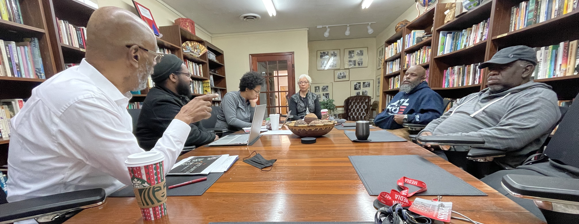
How to help news flourish in ‘urban micro-deserts’
On February 21, 2022, Knight Foundation announced an investment of over $4 million in legacy publishers and startup networks to become more financially sustainable to better serve communities of color. Jim Brady shares more below.
When we talk about “news deserts,” our thoughts go to large rural areas that lack – or may soon lack – a reliable source of local news. It’s a real problem. But what gets lost in that discussion is the threat of urban micro-deserts: neighborhoods inside cities that increasingly lack these same reliable news sources.
These neighborhoods, many home to underrepresented communities, don’t get much coverage from metro dailies or local TV, except too often when it comes to crime. And the Black-owned newspapers that serve many of these communities have typically been around for generations, but were slow to start their digital transformations.
A 2021 study from the Center for Community Media at CUNY found that Black media published six times more coverage than mainstream media on issues of importance to Black communities, such as racism, health disparities and voting access. Assuring a strong future for the Black press is crucial to maintaining diverse local news ecosystems that inform and engage underrepresented communities.
That’s why I’m excited about Knight Foundation’s latest investments of more than $4 million, which focus on uplifting legacy Black-owned news organizations, seeding startups that serve Black, Indigenous and People of Color (BIPOC), and giving diverse female and non-binary leaders access to mentorship that they need to become future leaders.
We’ve seen the amazing work done by the Local Media Foundation’s Word in Black collaboration of Black newspapers and its Digital Transformation Lab. The Lab’s cohort of five newspapers saw digital revenues more than triple over the course of the program. The cohort includes the Atlanta Voice, Dallas Weekly, New York Amsterdam News, Houston Defender and Washington Informer. Our investment will enable the Lab – now renamed the Knight x LMA BloomLab – to hire support staff to scale the program to 26 news outlets over three years, with the veterans of the program helping mentor the rookies.
One great success story of the Lab is the transformation of the Houston Defender, which used its learnings to redesign its print edition, create an email newsletter strategy, and launch an online events business. And it raised $110,000 through the COVID-19 Local News Fund, which astonished CEO and publisher Sonny Messiah Jiles.
“The Lab introduced me to a whole new world of digital strategies, tactics, resources, and tools,” Jiles said. “The hands-on customized training recognized my limitations yet challenged me to experiment and embrace new technology and taking calculated risks. The result was the construction of a new Defender on multiple platforms providing better service to our readers, advertisers, and community. With the Knight x LMA BLOOM Lab, we can invest in the infrastructure necessary to help train our staff, purchase new equipment, and fine-tune our strategies ensuring our sustainability.”
On the startup front, Knight is also investing in Capital B and URL Media, digital startups serving BIPOC communities in different ways. Capital B aims to create a new nonprofit news service for Black audiences, with not just a national site but local bureaus, with its first being in Atlanta. Capital B is led by two longtime digital innovators: Lauren Williams, former editor-in-chief of Vox, and Akoto Ofori-Atta, former managing editor of The Trace.
Rather than primarily creating new content, URL Media provides the business muscle for a growing network of BIPOC media outlets in communities across the country. While it’s important for these outlets to cover their communities authentically, they won’t be able to do it forever if they don’t build sustainable revenue models. URL Media is creating a new ad network for its partners, and providing other revenue-focused services. URL was founded by two influential leaders: Sara Lomax-Reese, the CEO of WURD Radio, and S. Mitra Kalita, a former CNN digital executive and current publisher at Epicenter NYC.
All the publishers mentioned above will eventually be on the lookout for the next generation of leaders. That’s why we are also investing in the International Women’s Media Foundation’s Gwen Ifill Mentorship Program. We want to give young female and non-binary leaders from underrepresented backgrounds the opportunity to match up with mentors who can show them the way. (You can see the 2022 cohort here.)
Knight has long supported communities of color – and the news publishers that serve them. These investments are only the beginning of our efforts to make sure communities in urban micro-deserts have the news and information they need to make informed decisions and flourish. We expect to make more investments in this area in 2022, with a continued focus on business sustainability and entrepreneurial efforts.
Jim Brady is Knight Foundation’s vice president of Journalism.


